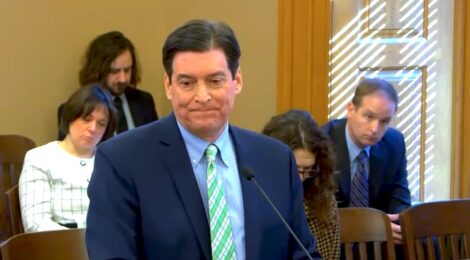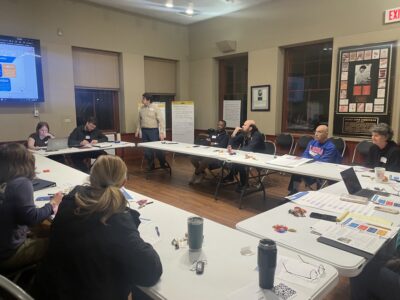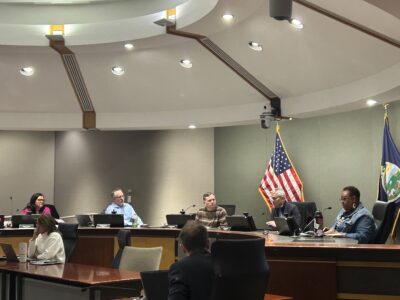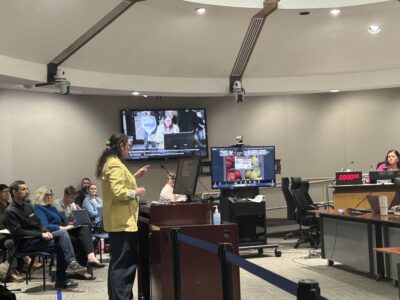Kobach flew in KU jet for lunch, speaking engagement; university says cost to taxpayers was $4,400

Kansas Secretary of State Kris Kobach speaks during a news conference Tuesday, Feb. 17, 2015, in Topeka.
Topeka ? In February 2015, Kansas Secretary of State Kris Kobach chartered a private jet owned by the University of Kansas so he could attend a luncheon in Wichita and speak at the Kingman County Career Day in the town of Kingman, about 45 miles west of Wichita.
The cost of that flight, according to KU officials, was $4,400. That cost ultimately was charged to the Secretary of State’s office.
That flight, which was documented in a recent University Senate report, represents one example of why some faculty, staff and students at KU are now calling on the administration to sell that plane, a move they say would not only generate about $6.6 million in immediate cash, but also save the university more than $1 million a year in operational costs.
Related story
But it also has caught the attention of some in the Kansas Legislature who are calling for a broad review of the state’s entire aircraft fleet, with an eye toward liquidating at least part of it.
Kobach, a Republican who was first elected Secretary of State in 2010, is now a candidate for governor in the 2018 election. And as part of his campaign, he has frequently criticized the Legislature for what he has called its “culture of corruption.”
That has rankled the feathers of some GOP leaders in the Statehouse, and those feathers weren’t smoothed when learning about Kobach’s $4,400 flight to a lunch and speaking engagement.
“When we’re talking about, obviously, the corruption in Topeka, why couldn’t you drive to Wichita? Why would you need to take a plane?” Rep. Troy Waymaster, R-Bunker Hill, who chairs the House Appropriations Committee, asked rhetorically during a recent interview.
Waymaster said he plans to conduct a comprehensive review of the state’s aircraft fleet as part of this year’s budget-writing process.
“I know there might be time constraints; there might be scheduling issues,” Waymaster said. “But if I have to go anywhere in the state, I have to drive. Now, I’m not an elected executive officeholder. But I still think, if you’re looking at trying to use the dollars that taxpayers send to Topeka, driving would be far more efficient than using a state plane.”
The University Senate committee that wrote the report, however, said the actual cost to KU may have been considerably higher.
After examining all of the flights taken by the jet over a 25-month period, from January 2015 through February 2017, the committee concluded that the actual operational cost penciled out to $4,856 per hour flown, or $15.01 per nautical mile flown — rates that the committee said were far above industry averages for that type of plane.
At that rate, according to the committee’s figures, the actual cost would have been between $5,341 (for the 1.1 hours of flight) and $10,567 (for the 704 nautical miles flown).
A KU spokesman said KU officials do not necessarily accept those estimates.
The private jet that Kobach and one of his aides used for the trip, a Cessna CJ4, has been the target of questions and criticism since the university acquired it around January 2015 at a reported cost of $8.1 million, a purchase funded by the KU Endowment Association.
Related stories
• March 1, 2015 — Taxpayers footing the bill for hundreds of flights that KU defends as essential
• March 16, 2015 — At $1.5 million a year, KU’s jet is a bargain, officials tell state legislators
And while its purpose ostensibly is to serve the university’s own travel needs — athletics recruiting, donor relations and operations of the KU Medical Center, according to KU officials — the university says the jet also is made available on occasion to other state agencies.
“Since KU is a state agency, we have occasionally allowed state agencies to use the university’s aircraft,” KU spokesman Joe Monaco said in an email. “Relatedly, KU occasionally uses state aircraft when we have multiple requests that we are not able to fulfill with our own university aircraft.”
Monaco added that the university operates the plane under Federal Aviation Administration regulations that require all flights to be paid for from the state treasury, explaining why the costs were billed to the Secretary of State’s office.
Kobach did not respond personally to telephone messages requesting comment. But his spokeswoman, Samantha Poetter, said in an email that Kobach limits his use of state airplanes, but at times, he travels by state plane due to scheduling reasons. She also said Kobach has reduced other overhead costs in the Secretary of State’s office.
“This flight took place in (fiscal year 2015), costing the agency $4,400 in a year that the agency spent $300,000 less than the prior year,” she wrote. “The state planes that are normally used by statewide officers were unavailable. The KU plane is one of the alternatives that is used under such circumstances. Secretary Kobach’s record of fiscal responsibility is undeniable.”







